Snowmobile HOF and Museum Announces Inductees

The Snowmobile Hall of Fame and Museum in St. Germain, Wis. has announced its latest round of inductees. Bob Enns, Herb Howe, Mark Zelich and Pat Mach will be enshrined at the museum on February 7. Below are bios produced by the Snowmobile Hall of Fame and Museum.
Bob Enns
Career Span: 1969-1995 Brands Represented: John Deere, Polaris, Ski-Doo Age at Induction: 63
Beginning in 1969 and continuing for more than a decade, Bob Enns of Oak Bluff, Manitoba, poured his passion for snowmobile racing into a career that shined with victories in oval and cross-country competition. He was a four-time ICCSF cross-country race winner with multiple top-10 overall season high-point finishes.
His career began on the oval tracks of Manitoba, racing Polaris and Rollo-Flex machines to dozens of victories including a win at the Canadian Power Toboggan Championships in Beausejour. In 1972 Enns competed in and won his first ever cross-country race aboard a John Deere. Racing for John Deere the following year, Enns would ride the wave of popularity in cross-country for the rest of the decade. He was named to the legendary Enduro Team Deere program in for 1976 and responded by winning the prestigious ICCSF Eagles Heartland Grand Prix in Park Rapids, Minn. Enns started the 1977 with another ICCSF win, this time at the Peace Garden Classic in Bottineau, ND. He followed it up mid-season with consecutive wins in Willmar and Sauk Centre, Minn., the first driver to win three events in a season on the ultra-competitive ICCSF circuit. Enns raced for Ski-Doo and Deere in subsequent seasons before retiring from full-time competition after 1980.
After retiring from full-time competition in 1980, Enns helped grow his family’s business into one of the largest John Deere and Ski-Doo dealerships in Canada. His was highly regarded among his teammates and fellow racers as a kind, good-natured rider who truly enjoyed the spirit of snowmobiling competition.
Herb Howe
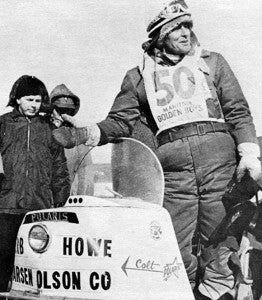 Career Span: 1965 – 1994
Brands Represented: Polaris, Husky
Age at Induction: 84
Career Span: 1965 – 1994
Brands Represented: Polaris, Husky
Age at Induction: 84
There had to be a first-ever champion of the first-ever 1966 Winnipeg-to-St. Paul International 500 cross-country race, and the future of sport could not have done better than the gregarious winner Herb Howe. Howe would pair his epic accomplishment and other racing victories with his penchant for great story telling to enjoy decades of notoriety while helping to grow the legend of the classic St. Paul Winter Carnival event.
A tall and robust racer as well as VP of Sales for Polaris distributor Larsen Olson, Howe captained a team of 21 racers who competed throughout the Midwest in ASA and USSA oval and cross-country. Howe won events in racing hotbeds like Munising, Antigo, Rhinelander, Houghton, Grand Rapids, Fergus Falls, Brainerd and at the World Series in Booneville, NY. He competed in the Winnipeg I-500 for 10 consecutive years, finishing seven of them to underscore his skill and tenacity in an era when fewer than 25 percent of the entrants would finish each event. He amassed 247 career podium finishes before retired from racing in 1976.
After hanging up his race bib he became Race Director for the I-500 and was responsible for routes, permits, timing, tech, fueling and surveillance until the Winter Carnival event ended in 1980. He reprised many of the same responsibilities again beginning in 1987 with the Jeep I-500 cross-country between Thunder Bay, Ontario, and White Bear Lake, Minn., producing what is widely considered the most challenging of all I-500 XC courses. When the final Thunder Bay I-500 ran in 1994, Howe ended his direct involvement with snowmobile competition. He currently lives in Siren, Wis.
Mark Zelich
Career Span: 1964 – 1987 Brands Represented: None Age at Induction: 86
Likely the first television personality to dedicate regular attention on snowmobile competition, Mark Zelich of Wausau, Wis., brought the captivating race images and stories of the Wisconsin North woods into the living rooms and imaginations of viewers. His weekly coverage of snowmobile racing helped grow the fledgling sport of snowmobile racing from local community contests in the mid-1960s to nationally televised sports events like the Eagle River World Championships. It was Zelich himself who originated the idea of naming the Eagle River Derby the “World Championship.”
As sports director of WSAU television in Wausau, Zelich began covering cross-country competitions like the Rhinelander Hodag, using a single 16mm film camera with no sound to singlehandedly film and narrate 90-second segments as part of his nightly sports segment. As the sport progressed – in part due to the regional and national coverage that Zelich was responsible for – he incorporated greater resources and production techniques that would culminate with 30-minute specials that were broadcast regionally, as well as syndicated segments that were distributed throughout North America.
While Zelich was impressed with the drama of snowmobile competition, he was most captivated by the racers themselves, whom he regarded as truly remarkable athletes coupling their competitive zeal with determination and courage in making the World Championship the preeminent event in snowmobiling. The world loves a champion, and Zelich gave them one in each of his regular sportscasts, helping to make household names of the first generation of racing heroes. Zelich objectively focused on racers who were most newsworthy, regardless of their home state or country, treating them the same as he would all professional sports athletes. He maintained his regular focus on snowmobile competition through the 1980s, before retiring as News Director in 1994.
Pat Mach
Career Span: 1990 – 2001 Brands Represented: Arctic Cat, All Age at Induction: Posthumously
A cross-country racing fan, then racer and eventually one of its saviors, Pat Mach of Minto, ND, experienced the full breadth of what it meant to love and support all aspects snowmobile competition. He founded the United States Cross-Country Circuit (USCC) in 2002, growing it into the premier terrain racing organization until his passing a decade later.
Like many of his Midwestern counterparts, Mach grew up idolizing cross-country snowmobile racers. After graduating from college in 1990, Mach began a professional cross-country racing career that would last more than 10 years as a member of Team Arctic. After the sport suffered a long period of reduced interest, with various racing organizations ending after the 2001 season, Mach took it upon himself to form USCC and re-launch the sport itself. With an affable personality and a tireless work ethic, Mach and his family recruited similar-minded people to staff USCC whose combined grassroots approach would grow the sport of cross-country as well as the prestige of USCC.
Through the USCC, Mach reprised the International 500 cross-country race while also expanding events and partnerships in Michigan and on the East coast that further grew the sport. Mach was thoroughly respected and appreciated by racers, crew members and families thanks to his dedication to racers and his prioritization of safety at all USCC events. He remained the driving force for premier cross-country competition until he passed away at the age of 42 in a snowmobile trail riding accident on February 5, 2011.



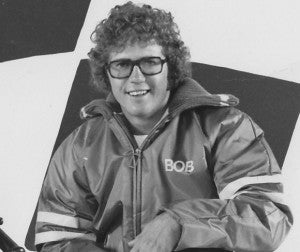
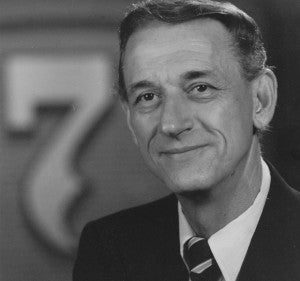
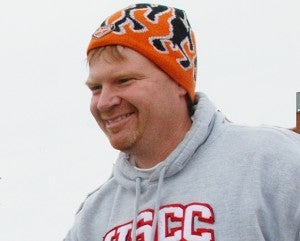
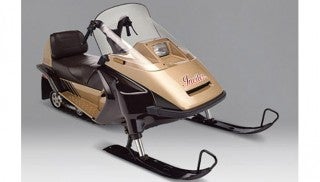
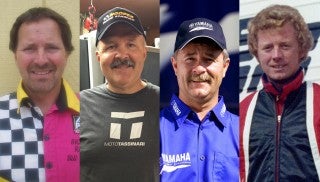



 Your Privacy Choices
Your Privacy Choices